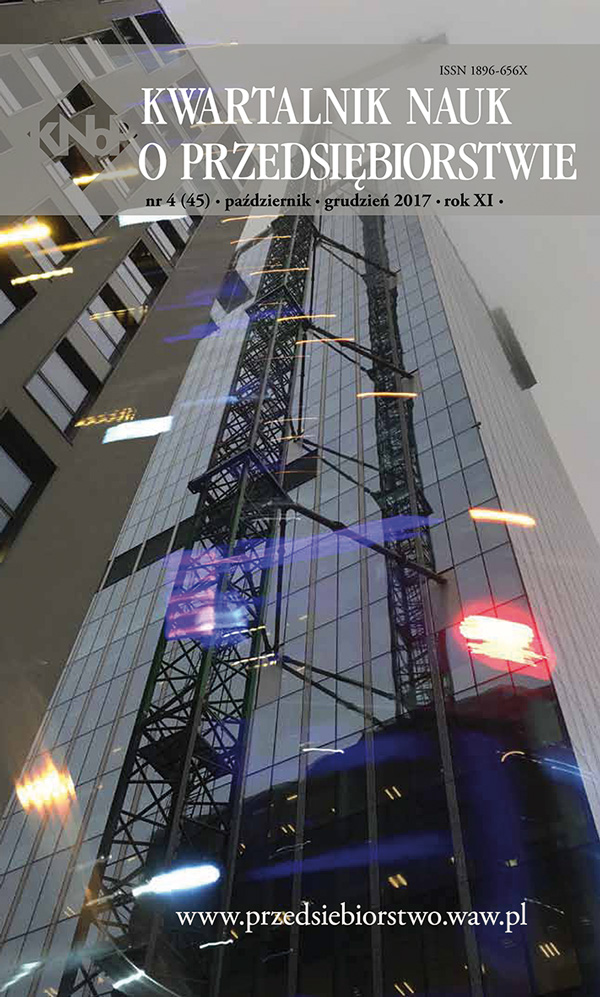Science and technology park management models
Main Article Content
Abstract
The article presents four models of science and technology park management, built on the basis of the results of the analysis of 15 selected parks in the world. It discusses the basic functions of the park, advantages and disadvantages of each of the models, indicating also the possibilities of their further development. It has also been related to the Polish conditions, which proved that two models are most suitable for Poland: corporate and network. The corporate model, based on an active cooperation of a technical university with public and private entities, in the opinion of the Authors, is the most appropriate to be applied in the case of science and technology parks created near technical universities. An alternative solution to the corporate one is a network model, allowing for creation of sci-ence and technology parks with scattered spatial structure.
Downloads
Article Details
The author of the article declares that the submitted article does not infringe the copyrights of third parties. The author agrees to subject the article to the review procedure and to make editorial changes. The author transfers, free of charge, to SGH Publishing House the author's economic rights to the work in the fields of exploitation listed in the Article 50 of the Act of 4 February 1994 on Copyright and Related Rights – provided that the work has been accepted for publication and published.
SGH Publishing House holds economic copyrights to all content of the journal. Placing the text of the article in a repository, on the author's home page or on any other page is allowed as long as it does not involve obtaining economic benefits, and the text will be provided with source information (including the title, year, number and internet address of the journal).
References
EC [2014], Setting up, managing and evaluating EU Science and Technology Parks. An advice and guidance report on good practice, European Commission, Regional and Urban Policy, October 2013, EU 2014.
EKE-S [2010], Europejskie parki technologiczne, przemysłowe i naukowe w dobie zarządzania kryzysem, przygotowania do okresu po kryzysie i strategia po cyklu lizbońskim, Europejski Komitet EkonomicznoSpołeczny, opinia dodatkowa, 2011/C 44/22, Bruksela, 14 lipca 2010.
Florida R. [2010], Narodziny klasy kreatywnej, Warszawa, Narodowe Centrum Kultury.
Gorynia M., Jankowska B. [2007], Koncepcje klasterów jako sposób regulacji zachowań podmiotów gospodarczych, „Ekonomista”, nr 3.
IASP [2014], International Association of Science Parks Survey 2014, http://www.iasp.ws/statistics, dostęp 12/11/2014.
IPO [2009], Parki przemysłowe, technologiczne i specjalne strefy ekonomiczne, Raport, Portal IPO.pl.
Łobejko S. [2010], Przedsiębiorstwo sieciowe. Zmiany uwarunkowań i strategii w XXI wieku, Warszawa, Oficyna Wydawnicza SGH.
Łobejko S. (red.) [2012], Przedsiębiorstwa sieciowe i inne formy współpracy sieciowej, Warszawa, Oficyna Wydawnicza SGH.
Łobejko S., Sosnowska A. [2015], Management Models of a Science and Technology Parks: Foreign Experiences and Recommendations for Poland, „Optimum: studia ekonomiczne”, nr 5 (77), s. 77-92.
Marciniec B.M. [2007], Rola parków naukowo-technicznych w rozwoju małych i średnich przedsiębiorstw, Poznań, Wydawnictwo Poznańskie.
Mażewska M. [2011], Strategiczne obszary rozwoju parków technologicznych, PARP, Warszawa.
NET [2007], Parki Technologiczne USA, Nauka-Edukacja-Technologia (NET), Management and Organization of Technology Parks in the US, Raleigh/Newark/Philadelphia/College Park/Rockville 18-25 kwietnia 2007, http://deltechpark.org/, dostęp 25.11.2014.
Raport Pro-Dev. [2014], Analiza najlepszych praktyk dla modułu zarządzania parkiem technologicznym i biznesowym, Raport z badania międzynarodowych parków naukowo-technologicznych zrealizowany na zlecenie firmy Pro-Development, Warszawa.
Sanni M., Egbetokun A.A., Siyanbola W.O. [2010], A model for the design and development of a Science and Technology Park in developing countries, MPRA Paper 25342, 2009, “International Journal Management and Enterprise Development”, Vol. 8, No. 1 (2010), p. 62-81, DOI: 10.1504/ IJMED.2010.029761.
UNESCO [2014], Science Parks around the World, http://www.unesco.org, dostęp 15/11/2014.
Weresa M.A. [2014], Polityka innowacyjna, Warszawa, Wyd. Naukowe PWN.

